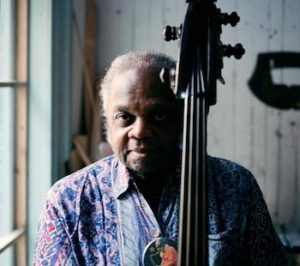
Henry Grimes
*Henry Grimes was born on this date in 1935. He was a Black musician and poet.
Henry Grimes was born in Philadelphia, and his family lived in a musical community. His twin brother Leon played clarinet and tenor saxophone. His father, Leon James Grimes, Sr., played trumpet, and his mother, Georgia Elzie Grimes, played piano. Before he was born, it is believed they both played professionally, but at some point, they both decided to stop, and he didn’t remember ever hearing them play.
In his childhood, both his parents worked in Horn & Hardart Automats around 15th St. and 9th St. His father was a cook, and his mother was cleaning. Grimes grew up at 17th and Fitzwater on Philly’s south side and attended Arthur Elementary School, Barrett Junior High, Mastbaum Technical High School, and then the Juilliard School in New York City. In high school, he also began playing tuba, English horn, and percussion. There was a piano in the house, but the only person Henry remembers playing it with (other than himself) was pianist Hasaan Ibn Ali.
Bebop was the day's music, and Charlie Parker, Dizzy Gillespie, and Clifford Brown were favorites. As a youngster, he attended his older sister’s graduation from her all-girls high school. The school orchestra played, and Grimes was overwhelmed by the sound of the violins. He longed to play his violin and went home and told his mother he needed one. His parents found a local violin teacher named Carl Whitman, who came to the house carrying a “banged-up fiddle” for Grimes.
He studied violin with Mr. Whitman from age 12 to 16 and then with a Hungarian violin teacher until he went to Juilliard and devoted himself entirely to the bass. Also during this time, he met drummer Albert “Tootie” Heath, pianist Bobby Timmons, and trumpeters Ted Curson and Wilmer Wise. By the mid-1950s, Grimes recorded or performed with saxophonists Gerry Mulligan and Sonny Rollins, pianist Thelonious Monk, singer Anita O'Day, clarinetist Benny Goodman, and others.
When bassist Charles Mingus was experimenting with a second bass player in his band, Grimes was the person he selected for the job. One of his earliest film appearances is captured in the Bert Stern documentary on the Newport Jazz Festival of 1958, Jazz on a Summer's Day. He was 22 years old, and as word spread among the musicians about his extraordinary playing, he ended up playing with six groups at the weekend festival. Gradually growing interested in free jazz, Grimes performed with most of the music's important names, including pianist Cecil Taylor, trumpeter Don Cherry, and saxophonists Steve Lacy, Pharaoh Sanders, Archie Shepp, and Albert Ayler.
He released one album, The Call, as a trio leader 1965. The album features Perry Robinson on clarinet and Tom Price on drums. In the late 1960s, Grimes's career halted after his move to California. It was commonly assumed Grimes had died; he was listed as such in several jazz reference works. In 2002, Marshall Marrotte, a social worker and jazz fan, found Grimes alive but nearly destitute, without a bass to play, renting a room in Los Angeles, writing poetry, and doing odd jobs to support himself. He had fallen out of touch with the jazz world but was eager to perform again.
Word spread of Grimes's return, and some musicians and fans offered to help. Bassist William Parker donated a bass, and others assisted with travel expenses and arranging performances. Grimes's return was featured in The New York Times and National Public Radio. In 2003, he performed at several music festivals and other appearances, including the free jazz-oriented Vision Festival. He was on air from WKCR-FM's studios at Columbia University in New York within weeks of his return to New York.
Grimes also began teaching lessons and workshops for bassists. In 2004, he recorded as a leader with David Murray and Hamid Drake, and in 2005, with guitarist Marc Ribot, who also wrote an introduction to Grimes' first book, Signs Along the Road, published in March 2007 by Buddy's Knife Jazz edition in Cologne, Germany, a collection of Grimes' poetry in which he presents his writings while he was not playing music. Also in 2007, Grimes recorded with drummer Rashied Ali, a trio with Marilyn Crispell, and in 2008 with Paul Dunmall and Andrew Cyrille.
Grimes has also held several residencies and offered workshops and masterclasses on significant campuses. Grimes made his professional debut on a second instrument (the violin) at Lincoln Center and created illustrations to accompany his new recordings and publications. He has received many honors in recent years. Henry Grimes is now a resident of New York City and has a busy schedule of performances, clinics, and international tours.
Henry Grimes died on April 15, 2020, at age 84, from complications of COVID-19.